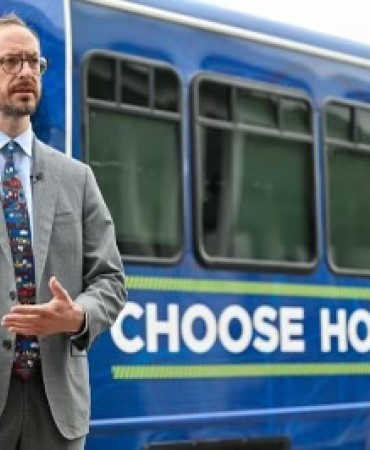For more than a decade, Nashvillians have been sharing their ideas about how to tackle traffic and improve our commutes. On Tuesday, they'll lend their voice once more when they vote on the Choose How You Move Transit Improvement Program referendum.
In multiple surveys, Nashvillians have shown overwhelming support for improving the city's transportation system, and on November 5, residents across the county have the chance to dedicate revenue specifically to support transportation improvements for the first time in the Nashville's history. That dedicated revenue will make the city more competitive for federal transportation grants for the first time in the last quarter century.
During the campaign Mayor Freddie O'Connell committed to seeking dedicated funding for transportation, knowing it was a key vehicle to reducing household cost of transportation. After election, his transition committee to study How Nashville Moves recommended early action on a transportation referendum.
In Nashville, the average household cost of transportation has surpassed the average cost of housing (Source: Economic Policy Institute). AAA estimates that Nashvillians spend $1,000 per month to own, lease, gas, park, and maintain a new car. Absent any alternatives to get to work or school, that amounts to an implicit tax on Nashvillians.
According to Imagine Nashville, 90% of Nashvillians agree that investing in city-wide public transportation is an important priority for the future. In the annual Vanderbilt poll, 84% supported the plan to put a transportation referendum on the ballot.
With that data in hand, the mayor's team set out to build a transportation improvement program that had the maximum impact all around the county for the minimum cost.
When the mayor unveiled the Choose How You Move: All-Access Pass to Sidewalks, Signals, Service, and Safety transportation improvement program in April at an event at the Southeast Community Center, he described the opportunity ahead for Nashvillians.
"This is how we fix ditches and dirt paths where people are trying to walk," Mayor Freddie O'Connell said. "This is how we bring back home billions of dollars of our own taxpayer money that we're literally sending to other cities right now to invest in themselves. And this is how we invite our visitors and neighbors to help us pay for things we all need."
In the months since, the mayor and Metro staff have embarked on a daily effort to share the details of the program to ensure voters are informed as they go to vote.
Since April, the city team has engaged more than 9,000 people while attending 379 events, meetings, and sessions focused on Choose How You Move, including:
- 225 sessions/talks where the team presented elements of Choose How You Move
- 12 advisory meetings involving technical or community stakeholders
- Conversations with at least 38 of 40 Metro Council Members
- 7 official touchpoints with Metro Council and their committees, with 3 readings before the full Council
The core tenets of the plan focus on connecting communities and neighbors to one another. Nashvillians can look forward to:
- 86 miles of new or upgraded sidewalks that don't stop one block from a school or community center, leaving us walking in a ditch
- Doubles the hours of high-frequency daily service to 24/7/365, with crosstown and express routes that make sense if – or when – we want to use public transportation
- A collection of 12 neighborhood transit centers that break up the antiquated hub and spoke model for our public transportation, making it more efficient for riders
- Upgrades to smart signals at 2/3 of our intersections that don't leave us sitting at red lights when no one is coming the other way
- Safety improvements across the system, including to 35 intersections where the majority of our serious and fatal accidents occur
The program, which passed Metro Council unanimously to be placed on the ballot, is funded by a half penny sales tax that would cost the average family $6 per month. However, with the improvements in the Choose How You Move program, a Nashvillian that lives within a quarter mile of a transit stop spends $200 less per year on transportation.
"Choose How You Move is how we stop kicking the can down the road on a problem and start moving forward on a solution," Mayor O'Connell said. "Doing nothing is always an option. But we all agree that's not working. We take a big step down the long road toward progress if voters decide Choose How You Move should pass."


